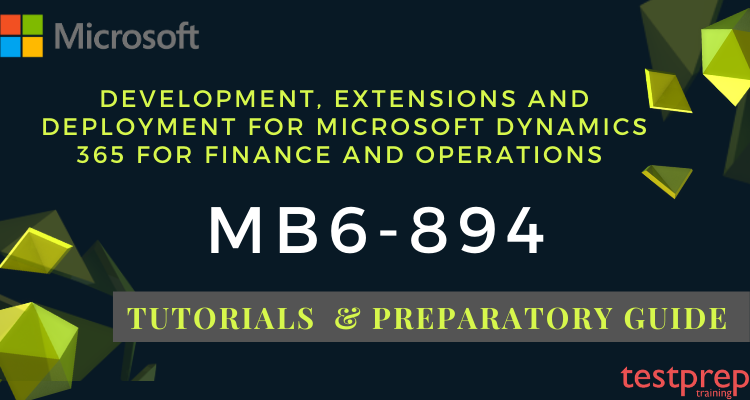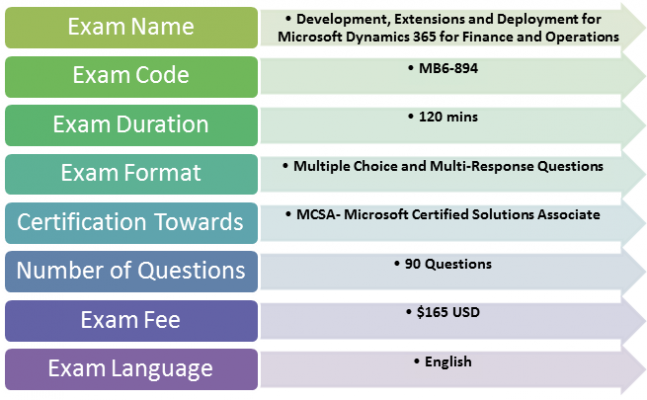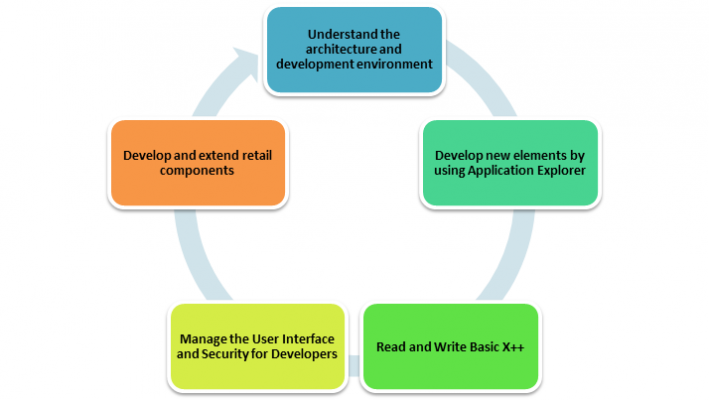Exam MB6-894 : Microsoft Dynamics 365

Certifications from Microsoft are without a doubt the most valuable ones around the world. Microsoft, the global leader in software helps you validate your skills and stand out from the crowd. Moreover, their Certification Programmes educate you about the proper use and management of technology, thereby making your academic records shine.
The MB6-894 Development, Extensions and Deployment for Microsoft Dynamics 365 for Finance and Operations Exam acts as a bridge to your dream career. However the preparations are quite tough. Also, such certification exams require expect guidance and proper training for you to succeed. Don’t be worried, as in in this article; we’re going to provide you with tutorials and a specially curated preparatory guide.
What is Microsoft MB6-894 Exam?
The Microsoft MB6-894 Exam helps you improve your Dynamics 365 for Finance and Operations (formerly known as dynamics ax training) technology skillsets. Qualifying this exam will allow you to prove their worth related to this skill set. By clearing the MB6-894 Exam you will be eligible to become a Microsoft Certified Solutions Associate.
Why Choose Microsoft MB6-894 Exam?
Microsoft certification is one of the most prized accolades any IT professional can add to their resume. You should definitely choose the MB6-894 exam as it provides the following benefits-

Validates your skills
This certification validates your Dynamics 365 for Finance and Operations technology skillsets. It also demonstrates your expertise and knowledge.
Enhances Employability
This certification boosts your skills and therefore enhances your employability by making you job ready.
Higher growth opportunities
This certification guarantees high growth opportunities. About 23% of Microsoft certified professionals reported receiving up to a 20% salary increase. It also helps you chase further advanced goals in the field of IT.
Provides competitive edge
Microsoft Certifications provide you with a competitive edge over non certified candidates. It is estimated that certified employees earn 15% more than those without certification and are nearly 20% more productive.
Brings recognition
You’ll make immediate impact as a Microsoft Certified Solutions Associate. This credential will help you in getting noticed and bring recognition.
Additionally, once you’re certified you will be able to share your achievements through your Microsoft Badge. This Microsoft Badge can be shared online within your professional network as it trusted and verifiable. It also helps find jobs easily and increases your salary potential.
Exam Details: Microsoft MB6-894

Before venturing into the preparations its handy to know all about the exam. Deep understanding about the details of the exam will lead you to earning the credential.
To begin with, the examination comprises of around 90 questions. You need to finish the examination within 120 minutes. The exam is available in the English language only.

Question Format
This Microsoft Exam covers 90 questions. Here is a list of the questions formats that the Microsoft exam includes-
- Firstly, Build list
- Secondly, Case studies
- Subsequently, Drag and drop
- Then, Hot area
- Additionally, Multiple choice
- Also, Repeated answer choices
- Lastly, Short answer
Target Audience for MB6-894 Exam
The exam is best suitable for technical consultants, programmers, or IT candidates. This exam helps Professionals to earn advance IT goals. Also, candidates who implement the basic technical and development tasks required to customize Microsoft Dynamics 365 Finance and Microsoft Dynamics 365 Commerce.
Prerequisites
Now it’s time to review the prerequisites for the exam. To begin with, you must have the basic knowledge of Microsoft Dynamics 365 Finance and Microsoft Dynamics 365 Commerce. Additionally, expertise in Visual Studio and object-oriented programming is also desired. Further, moderate understanding of programming concepts and processes, as well as an understanding of Finance and Commerce modifications, enhancements, and new development projects that apply to the different business process scenarios.
Exam retake policy
If you were not able to clear the exam in the very first attempt, then remember it’s not the end of the road but just a small bump. Microsoft allows you 5 attempts per year for a specific exam. The exam retake policy is as follows-
- If a candidate is not able to clear the exam in the first attempt, the candidate must wait at least 24 hours before retaking the exam.
- If a candidate does not clear the exam the second time, candidate must wait at least 14 days before retaking the exam a third time.
- A 14-day waiting period is also there for the fourth and fifth subsequent exam retakes.
Cancellation and Reschedule Policy: Microsoft MB6-894
Microsoft allows free cancelling of the Exam within 24 hours prior to your scheduled appointment.
But, if you fail to show up on your exam day without rescheduling or cancelling your exam, Microsoft reserves all rights to forfeit your entire exam fee.
Rescheduling and Cancellation of your scheduled exams can be done through the Certification Dashboard.
Certification Validity
The MB6-894 Development, Extensions and Deployment for Microsoft Dynamics 365 for Finance and Operations Exam Certification have lifetime validity. It surely is your way to climb up your professional ladder.
Exam FAQ: MB6-894
In order to qualify the MB6-894 examination, you must have clarity about all the exam policies. For further queries visit Microsoft Dynamics 365 for Finance and Operations MB6-894 FAQs
Course Outline: MB6-894
Understanding the course outline of MB6-894 is the next important step. It familiarises you with the exam framework. The exam course includes 5 domains. The Percentage against each domain represents its weightage in the exam. Also, these domains are divided in to subtopics to provide further insights about the exam course.

Domain 1 – Understand the architecture and development environment (20-25%)
Describe the Microsoft Dynamics 365 Finance architecture
- Describe the development environment (Microsoft Documentation: Deploy and access development environments)
- Describe the components in the application stack
- Identify cloud architecture components (Microsoft Documentation: Microsoft cloud for enterprise architects illustrations)
- Explain the server architecture
- Describe the layered architecture (Microsoft Documentation: Finance and Operations application architecture)
Describe the Microsoft Dynamics 365 Commerce architecture
- Identify components of the retail solutions and their purpose (Microsoft Documentation: Dynamics 365 Commerce architecture overview)
- Describe differences and uses for the Retail Server and the Retail Store Scale Unit (RSSU) (Microsoft Documentation: Commerce Scale Unit (self-hosted), Configure and install Commerce Scale Unit (self-hosted))
- Describe hardware components
- Describe and create components for the Modern Point of Sale (MPOS) and the Cloud Point of Sale (Cloud POS) (Microsoft Documentation: Choose between Modern POS (MPOS) and Cloud POS)
Manage development with Microsoft Visual Studio and Lifecycle Services (LCS)
- Identify the windows and basic navigation of Visual Studio (Microsoft Documentation: Navigate code, Find code using Go To commands)
- Describe differences between and uses for projects, models, solutions, and packages (Microsoft Documentation: Models and packages, Solutions and projects in Visual Studio)
- Describe and perform the build process (Microsoft Documentation: Understanding the Build Process)
- Describe the features of LCS (Microsoft Documentation: Lifecycle Services (LCS) user guide)
- Use LCS to deploy hotfixes, manage assets, and complete the build process
Domain 2- Develop new elements by using Application Explorer (20-25%)
Create and manage labels and resources
- Create new label files (Microsoft Documentation: Create a Label File)
- Create and use labels (Microsoft Documentation: Create and Use Labels)
- Describe elements and uses for labels
- Identify best practices for labels (Microsoft Documentation: Best Practices for Labels)
- Identify uses for resources
Create and manage data types
- Describe uses for base enumerations (Microsoft Documentation: Best Practices for Base Enums)
- Create new base enumerations (Microsoft Documentation: Build extended data types and enumerations for Finance and Operations apps)
- Identify best practices for base enumerations (Microsoft Documentation: Best Practices for Base Enums)
- Describe primitive and extended data types (Microsoft Documentation: X++ extended data types)
- Create new extended data types (Microsoft Documentation: Create an Extended Data Type)
- Identify key properties for extended data types (Microsoft Documentation: Best Practices for Extended Data Type Properties)
- Implement best practices for extended data types (Microsoft Documentation: Best Practices for Extended Data Type Properties)
Create and manage tables
- Identify the components of a table
- Describe various types of table relationships (Microsoft Documentation: Setting Relationships Between Tables)
- Describe various types of table indexes
- Implement best practices for tables, relationships, and indexes (Microsoft Documentation: Best Practices: Tables)
Domain 3- Read and Write Basic X++ (20-25%)
Describe the X++ environment
- Identify the characteristics of X++ (Microsoft Documentation: X++ and debugger features)
- Use the code editor to write X++ (Microsoft Documentation: X++ Code Editor)
- Describe the features of IntelliSense (Microsoft Documentation: IntelliSense in Visual Studio)
- Identify basic syntax for X++ (Microsoft Documentation: X++ syntax)
- Describe the use of common keywords in X++ (Microsoft Documentation: X++ Keywords)
- Describe the features of the debugger (Microsoft Documentation: debugging)
- Use the comparison tool
- Use the best practice checker
Work with X++ control statements
- Work with variables, operators, conditional statements, and loops (Microsoft Documentation: Ternary Operator (?), X++ conditional statements)
- Use built-in functions; use communication tools (Microsoft Documentation: Built-in Functions (Azure Stream Analytics))
Work with classes
- Create new classes (Microsoft Documentation: Classes and methods, Create classes in Finance and Operations apps)
- Describe scoping events and parameters (Microsoft Documentation: Parameters and Scoping)
- Describe inheritance (Microsoft Documentation: X++ inheritance)
- Identify key best practices when writing X++ (Microsoft Documentation: Write best practice rules)
Manipulate data with X++
- Identify techniques for data retrieval (Microsoft Documentation: X++ data selection and manipulation overview)
- Explain uses for transaction integrity checking (Microsoft Documentation: Transaction Integrity)
- Insert, update, and delete records using X++
- Identify best practices for manipulating data with X++ (Microsoft Documentation: X++ data selection and manipulation overview)
Manage exceptions in X++
- Identify exception types (Microsoft Documentation: X++ exception handling)
- Use try/catch statements (Microsoft Documentation: Exception Handling with try and catch Keywords)
- Describe the features of optimistic concurrency control (Microsoft Documentation: Optimistic concurrency)
- Describe best practices for exception handling with X++ (Microsoft Documentation: X++ exception handling)
Domain 4- Manage the User Interface and Security for Developers (20-25%)
Manage the user interface
- Identify components of various form patterns (Microsoft Documentation: Form styles and patterns)
- Identify common form patterns and subpatterns
- Identify key properties for form elements (Microsoft Documentation: Form Control Properties)
- Apply and validate form patterns (Microsoft Documentation: Form styles and patterns)
- Describe uses for tiles (Microsoft Documentation: Navigation concepts)
- Describe how to join data in forms (Microsoft Documentation: Join Data Sources for a Form)
- Implement best practices for form development (Microsoft Documentation: Forms Best Practices)
Manage the user navigation
- Identify types of menu items (Microsoft Documentation: Menus and Menu Items)
- Create menu items and menus (Microsoft Documentation: Create Menus and Menu Items)
- Identify key properties for menu items (Microsoft Documentation: Menu Items Best Practices)
- Describe uses for menu items
- Implement best practices for menus and menu items (Microsoft Documentation: Menu Items Best Practices)
Manage security in the development environment
- Describe the security architecture (Microsoft Documentation: Security architecture)
- Describe the components of role-based security (Microsoft Documentation: Role-based security)
- Create new privileges, duties, and roles in the application explorer (Microsoft Documentation: Security and data entities, Manage user accounts, licenses, and roles)
- Describe the extensible data security framework (Microsoft Documentation: Developing Extensible Data Security Policies (White paper))
Domain 5- Develop and extend retail components (15-20%)
Modify retail components
- Describe the components of the Commerce Runtime (CRT) and how to extend the CRT (Microsoft Documentation: Commerce runtime (CRT) architecture and configuration, Commerce runtime (CRT) services)
- Describe the components of the Commerce Data Exchange (CDX) and how to extend the CDX (Microsoft Documentation: Channel database extensions, Commerce Data Exchange implementation guidance, Extend Commerce Data Exchange – Real-time Service)
- Identify components of the retail architecture that can be extended (Microsoft Documentation: Dynamics 365 Commerce architecture overview, Commerce runtime (CRT), and Retail Server extensibility)
- Describe how to extend various components of retail architecture. (Microsoft Documentation: Commerce Runtime (CRT) and Retail Server extensibility)
Deploy retail modifications
- Describe how to package and deploy retail modifications into a source environment (Microsoft Documentation: Create deployable packages)
- Review and apply retail hotfixes (Microsoft Documentation: Apply updates and hotfixes)
- Create and deploy packages for retail (Microsoft Documentation: Create deployable packages)
- Resolve conflicts and rebuild packages
Monitor retail components
- Identify, use and extend diagnostics and monitoring tools for retail components (Microsoft Documentation: Commerce component events for diagnostics and troubleshooting, On-premises diagnostics)
- Identify, setup, and monitor data distribution and offline databases (Microsoft Documentation: Channel databases and offline databases for Retail, Configure offline options for Retail Modern POS)
- Understand hot, warm, and cold paths for diagnostics and monitoring
- Use events logs, and LCS to monitor and diagnose issues with retail components (Microsoft Documentation: Commerce component events for diagnostics and troubleshooting)
Preparatory Guide : Microsoft MB6-894

The key to successfully pass an exam is by preparing right. Preparations demand consistency and determination. There are plenty resources available, for your preparations. This preparatory Guide will offer you a close view of the available learning resources and steps to pass the exam.
Step 1- Refer the Official Exam Guide
Firstly, you need to go through the official guide of Microsoft MB6-894 exam. Familiarise yourself with all the objectives and course domains of the exam. Further, devote enough time to each topic and have in depth knowledge of the subject by tailoring your study focus around the course domains. The official guide acts as a blueprint for the exam, hence always remember to refer it.
Step 2- Devise a Study Plan
The next step is to strategize a study plan for your preparations. While devising the plan keep in mind the course topics and time duration left for the real exam. Also, always begin by brushing up your weaker sections. Moreover, devote enough attention to topics which have a higher weightage in the exam. Following your plan will help you remain consistent and also help in avoiding distractions. Remember the key to excel is to start early, hence begin with your preparations and stay motivated.
Step 3- Study the traditional way through books
Books are the most important ingredient of preparation. There are a vast variety of books available in the market which you can use to prepare for the Microsoft MB6-894 Exam. Therefore, our suggestion to you would be to find books for the Microsoft mb6-894 exam from genuine sources.
We recommend you the Microsoft Dynamics 365 for Finance and Operations: Learn and understand the functionality of Microsoft’s enterprise solution by Andreas Luszczak

Additionally you can refer Implementing Microsoft Dynamics 365 for Finance and Operations: Implement methodology, integration, data migration, and more by Rahul Mohta.
Step 4- Online Learning Courses for self-paced training
Microsoft offers their online learning courses to provide you with the necessary tools and resources to implement the basic technical and development tasks required to customize Microsoft Dynamics 365 for Finance and Operations, and Microsoft Dynamics 365 Commerce. Also, these digital learning courses through the Microsoft Dynamics Learning Portal (DLP) are available to Microsoft Dynamics Partners who have purchased a training pack.
- 81213AE: Modeling Your Data With Visual Studio in Microsoft Dynamics 365 for Finance and Operations, Enterprise edition
- 81214AE: User Interface Development in Microsoft Dynamics 365 for Finance and Operations, Enterprise edition
- 81215AE: X++ Programming and Advanced Topics in Microsoft Dynamics 365 for Finance and Operations, Enterprise edition
- 81216AE: Development in Microsoft Dynamics 365 for Retail
- 81176AE: Introduction to Microsoft Dynamics Lifecycle Services (LCS)
Step 5- Join the Community
Online forums and study groups are indeed a great way to prepare for the MB6-894 Exam. The best way to get in touch with other candidates is through study forums or online groups. Moreover, you can ask a question related to the topic you’re having difficulty with.
Also, such groups provide regular insights about the exams. The discussions are really beneficial for you to excel the exam.
Step 6- Attempt Practice Tests
Finally, it is time to check your preparations. Self-Evaluation is the key and hence your next step is to go for practice tests. The more you’re going to practice, the better for you. These practice tests provide you with the real exam environment and also help you analyse areas that need improvement. Strengthening your weaker domains will surely help you pass with flying colours. So, attempt as many practice tests as you can. Start practising now.
Catapult your career with advanced learning skills and expert tutorials on Microsoft MB6-894 Exam. Certify and become a Microsoft Certified Solutions Associate.

